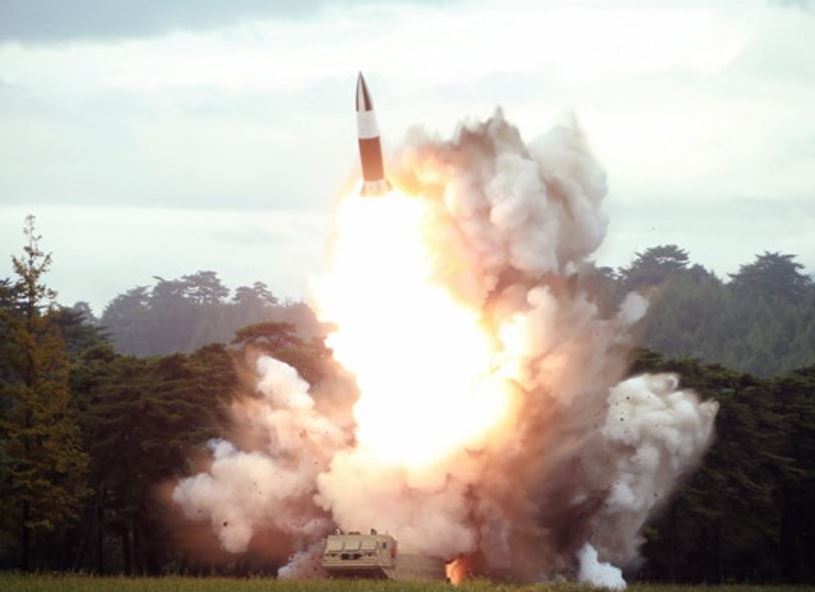N. Korea may launch 'maximum gray-zone' provocations for US concessions in 2020: expert
By YonhapPublished : Dec. 26, 2019 - 16:20
North Korea could launch maximum "gray-zone" provocations next year just short of an intercontinental ballistic missile launch to extract US concessions in their stalled nuclear talks, an expert said Thursday.
Jun Bong-geun, professor at the state-run Korea National Diplomatic Academy, made the remarks amid speculation that the North could engage in provocative acts in a show of anger over the absence of US concessions by Pyongyang's self-imposed year-end deadline.
"Though strong provocations are expected, the North may not go all the way to an ICBM launch, as the launch could make it difficult for Pyongyang to secure support from China and Russia," Jun said during a briefing on the outlook of global politics for 2020 by the KNDA Institute of Foreign Affairs and National Security.
Jun Bong-geun, professor at the state-run Korea National Diplomatic Academy, made the remarks amid speculation that the North could engage in provocative acts in a show of anger over the absence of US concessions by Pyongyang's self-imposed year-end deadline.
"Though strong provocations are expected, the North may not go all the way to an ICBM launch, as the launch could make it difficult for Pyongyang to secure support from China and Russia," Jun said during a briefing on the outlook of global politics for 2020 by the KNDA Institute of Foreign Affairs and National Security.

"But the North would pressure the US to make concessions and change its calculus while engaging in maximum gray-zone provocations," he added.
The professor did not elaborate on the gray zone provocations.
But they appear to be the North's military saber-rattling short of breaking its moratorium on nuclear and long-range missile tests, which US President Donald Trump has regarded as a key achievement of his personal diplomacy with North Korean leader Kim Jong-un.
Observers have speculated that Pyongyang could launch a satellite or intermediate-range or submarine-launched ballistic missiles within the "gray zone" that could generate intense attention but not directly threaten the continental US.
His institute's report on the outlook for next year noted that the North appears unlikely to launch an ICBM that will risk straining relations with China and Russia -- its two traditional backers that have recently proposed an easing of anti-Pyongyang sanctions.
In particular, an ICBM launch could irk China, as it could justify Washington's rationale behind its stepped-up missile defense in the region, particularly as it seeks to strengthen missile deployments following its withdrawal this year of the Intermediate-Range Nuclear Forces treaty, a key Cold War-era arms control accord.
As for inter-Korean ties, Lee Sang-sook, a researcher at the institute, raised the possibility that warming ties between South Korea and China and the positive international mood before and during the 2020 Tokyo Olympics could help create momentum for better cooperation between the two Koreas.
South Korean President Moon Jae-in and Chinese President Xi Jinping had their latest summit in Beijing on Monday in a sign of improvement in the two countries' relations, which have been frayed over the installation of a US missile defense system on the peninsula.
The two countries have also been seeking to arrange a visit to Seoul by Xi in the first half of next year.
On the relations between Seoul and Tokyo, IFANS forecast that the two neighbors could face conflicts over their long-running historical and territorial feuds, which could also be further affected by domestic politics and rising nationalism. (Yonhap)







![[Graphic News] More Koreans say they plan long-distance trips this year](http://res.heraldm.com/phpwas/restmb_idxmake.php?idx=644&simg=/content/image/2024/04/17/20240417050828_0.gif&u=)
![[KH Explains] Hyundai's full hybrid edge to pay off amid slow transition to pure EVs](http://res.heraldm.com/phpwas/restmb_idxmake.php?idx=644&simg=/content/image/2024/04/18/20240418050645_0.jpg&u=20240419100350)








![[KH Explains] Hyundai's full hybrid edge to pay off amid slow transition to pure EVs](http://res.heraldm.com/phpwas/restmb_idxmake.php?idx=652&simg=/content/image/2024/04/18/20240418050645_0.jpg&u=20240419100350)

![[Today’s K-pop] Illit drops debut single remix](http://res.heraldm.com/phpwas/restmb_idxmake.php?idx=642&simg=/content/image/2024/04/19/20240419050612_0.jpg&u=)